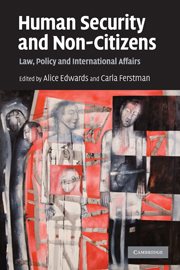Book contents
- Frontmatter
- Contents
- About the editors
- About the contributors
- Preface
- Acknowledgements
- Part I Human security, human rights and human dignity
- Part II Physical and legal security, armed conflict and refuge
- Part III Migration, development and environment
- Part IV National security and the ‘war on terror’
- 12 A distinction with a legal difference: the consequences of non-citizenship in the ‘war on terror’
- 13 Immigration law enforcement after 9/11 and human rights
- 14 Protection of non-citizens against removal under international human rights law
- 15 The human security framework and counter-terrorism: examining the rhetoric relating to ‘extraordinary renditions’
- 16 Legal routes to restoring individual rights at Guantanamo Bay: the effectiveness of habeas corpus applications and efforts to obtain diplomatic protection
- Index
12 - A distinction with a legal difference: the consequences of non-citizenship in the ‘war on terror’
Published online by Cambridge University Press: 17 February 2011
- Frontmatter
- Contents
- About the editors
- About the contributors
- Preface
- Acknowledgements
- Part I Human security, human rights and human dignity
- Part II Physical and legal security, armed conflict and refuge
- Part III Migration, development and environment
- Part IV National security and the ‘war on terror’
- 12 A distinction with a legal difference: the consequences of non-citizenship in the ‘war on terror’
- 13 Immigration law enforcement after 9/11 and human rights
- 14 Protection of non-citizens against removal under international human rights law
- 15 The human security framework and counter-terrorism: examining the rhetoric relating to ‘extraordinary renditions’
- 16 Legal routes to restoring individual rights at Guantanamo Bay: the effectiveness of habeas corpus applications and efforts to obtain diplomatic protection
- Index
Summary
Introduction
Much ink has been spilled since 11 September 2001 (9/11) about ‘lesser evils’: that sometimes a small evil must be done to avert a larger evil. That may be true. No political leader may responsibly urge fiat justitia et pereat mundus (let justice be done, though the world perish). But the lesser evil remains just that, an evil, and it is not always clear when a lesser evil graduates to a more significant wrong.
Underlying this point is a concern with the utilitarian impulse of national security. Guarding national security is, by definition, a majoritarian project: it serves the interest of the greatest number, enabling a state's inhabitants to continue their affairs in safety. Serving the interests of the majority may easily become conflated with serving the greater good. In extreme instances, maximising the good for the greatest number may justify injustices done to a minority. That minority may be large (citizens of Japanese origin interned in the United States and Canada during World War II) or relatively small (suspected terrorists tortured for intelligence). Nevertheless, the result is the same: the rights of the few are sacrificed in the name of securing the rights of the many.
Both historically and at present, the minority in question often comprises non-citizens or new citizens from ethnic or religious minority backgrounds. Alternatively, there may be a geography of rights observance: rights are violated abroad in the name of preserving them at home.
- Type
- Chapter
- Information
- Human Security and Non-CitizensLaw, Policy and International Affairs, pp. 421 - 458Publisher: Cambridge University PressPrint publication year: 2010
- 1
- Cited by

